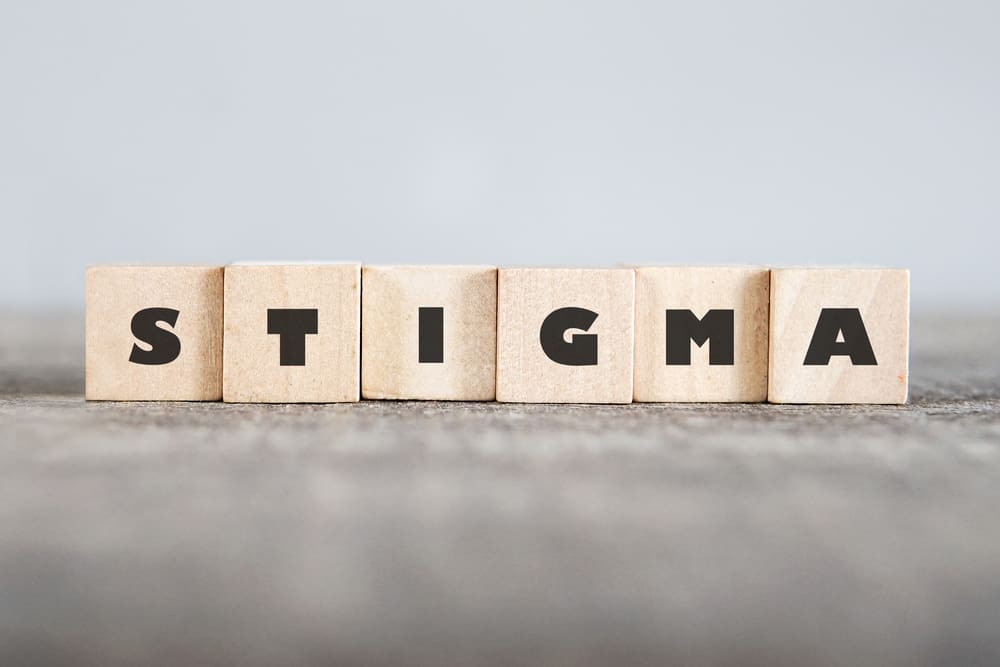What’s included?
- Introduction
- What causes the stigma around addiction?
- How has the stigma around addiction changed?
- Can you stop the stigma around addiction?
- How can Delamere help with the stigma around addiction?
The stigma around addiction can be traced back to the early 1800s. Over the hundred years that followed ‘alcoholics’ were labelled, clinicians who treated ‘addicts’ were criminalised, and ethnic groups were marginalised. Fast forward to present day and the stigma around addiction has changed, but still remains.
Despite substance use disorders now being classified as chronic diseases rather than a moral failing, many people with substance use disorders still experience humiliation, guilt and shame which can lead to terrible consequences. When healthcare professionals stigmatise patients, for instance, this impacts quality of care and can affect clinical outcomes.
Stigmatisation can also mean sufferers are reluctant to access medical help for fear of being embarrassed, leading to the vicious cycle of drug or alcohol abuse. By looking back at the lessons we’ve learned so far, and understanding how we can influence negative attitudes, we can all play our part in changing the stigma around addiction.

Need help for alcohol or drug addiction? Speak to Delamere
What causes the stigma around addiction?
Stigma is defined as “a strong feeling of disapproval that most people in society have about something, especially when this is unfair”. A study of 14 countries by The World Health Organisation found that Substance Use Disorder was among the most highly stigmatised of 18 different conditions (1).
Stigma around addiction exists among the general public – including the friends, family and colleagues of sufferers – and within professions that deal with addiction, such as social workers and medical staff. Stigmatisation can be caused by several factors:
Lack of understanding
Most of the stigma around substance use disorder comes from general ignorance or misunderstanding. Many people still believe that addiction is just a poor life choice. There is still a lack of knowledge among the general public around the definition of dependence and addiction, but this is being helped by information from government organisations, more accessible support groups and better healthcare training.
Personal experience
Someone’s direct experience with addiction can also colour their opinion. Medical staff who witness violent, drunken behaviour may take a dim view of alcoholics and feel more reluctant to help them access care. Family members, friends and colleagues can often blame the person suffering with substance abuse for negatively impacting their home or work life. This can also make the addicted person feel stigmatised, affecting their health and well-being.
Stereotypes in the media
People with substance use disorders are often portrayed negatively in the press, TV and films. Storylines commonly link drug and alcohol abuse with crime, unemployment, violence and neglect. On the flip side, addiction also be associated with the rich, party lifestyle and exotic locations. Films like Scarface, The Hangover and the Wolf of Wall Street have all been criticised for glamorising drug taking. Experts agree it’s important to start getting a more realistic representation of substance use disorders into mainstream media to help change outdated viewpoints.
Race, ethnicity, and culture
In the early 19th Century, African Americans and Chinese were singled out as being opioid users despite many white and middle-class women also having addictions. We’ve come a long way since then, but disparities still exist when addiction stigma intersects with racist and sexist views. Studies show ethnic minorities and males are still more likely to get arrested for drug offences than white people and women (2).
How has the stigma around addiction changed?
Canadian American sociologist, Erving Goffman, is best known for his study of symbolic interaction and, subsequently, theory of stigma. He concluded that there were three broad types of stigmas: those based on mental illness, physical deformity and race, ethnicity, sexuality or religion. He described stigma as an attribute, behaviour or reputation which is socially discrediting.
“The term ‘stigma’ describes the ‘situation of the individual who is disqualified from full social acceptance” – Erving Goffman (3)
Back in the 60s, Goffman discussed that certain groups, such as ‘gays’ and ‘drug addicts’ were the subject of labelling, stereotyping, social isolation and prejudice. While many of these problems are still widespread, there have been huge shifts in stigma over the last 50 years. The stigma surrounding drug and alcohol addiction has changed so much that people can now claim benefits for it as a debilitating health condition.
The language we used to describe people has also changed. In clinical settings, terms like ‘addict’, ‘junkie’ and ‘drunk’ have been replaced with ‘person with substance use disorder’, ‘person in active use’ and ‘person with alcohol use disorder’. These days, all healthcare professionals are encouraged to use the correct terminology to change stigmatising behaviour. Improvements in diagnostics and the ongoing reclassification of diseases is continuing to ensure people with substance use disorders are more fairly treated.
Can you stop the stigma around addiction?
Stigma has been around for centuries and it’s not going to disappear overnight. There will always be discrimination in our lives, but there are ways you can help to reduce the spread of stigmatising behaviour.
Do your research
Ignorance is not bliss. Especially for stigmatised groups. Learn the correct way to speak about different conditions and share accurate information with others. Access resources that explain alcohol and drug addiction in simple terms. The NHS website offers some really valuable guidance on addiction that’s easy to follow.
Change your language
Research shows ‘person-first’ language, which focuses on the person rather than the problem, is helpful in reducing the stigma around addiction. If someone is referred to as an ‘addict’, switch the narrative and show empathy that the person is suffering. Callout people who verbally abuse or bad mouth people with substance use disorders.
Speak up for others
Negative views and hurtful terms only become widespread if we let them. Speak up for people with substance use disorders and correct any negative language. Don’t encourage anyone who posts negative images or words surrounding alcohol or drug addiction on social media. You can also help by signposting resources to loved ones who are suffering with substance use disorders.
How can Delamere help with the stigma around addiction?
At Delamere, we’ve worked hard to break down the negative stereotypes surrounding addiction at our wellness retreat in Cheshire. We’ve actively moved away from stigmatising language and created an inclusive, welcoming environment. We treat people from all walks of life without judgement.
Set in six acres of woodland, our purpose-built centre is more like a luxury hotel than a hospital. From the onsite gym to restaurant quality meals, everything has been designed to make our guests feel safe, comfortable and above all, respected. Rooms are full of home comforts and family and friends are warmly invited to visit.

Our residential rehab programmes combine evidence-based psychotherapy with somatic healing techniques. We believe that every addiction has to start somewhere. Whether it’s due to past trauma or recent stressful events, we help people to understand the root cause of their problems and empower them to change.
We have a unique three-stage approach to recovery. Stage 1 helps to balance body and mind with a clinical detox, removing the physical and mental reliance on alcohol or drugs. Stage 2 is when we begin the healing process with one-to-one counselling, group therapy and holistic practices such as art, music and equine therapy.
During Stage 3 this is where you can start to grow beyond addiction. We want to help people leave with a future proof plan for lasting abstinence by learning tools to overcome triggers and live confidently without alcohol or drugs. All guests have access to 12 months of aftercare to support their goals.
If you are concerned about drug or alcohol addiction, call us confidentially to speak to a member of the team today. Contact Delamere.
References
1. Bustos-Gamiño M, Mora-Ríos J, Villatoro-Velázquez J, Fleiz-Bautista C, Molina-López A, Medina-Mora ME. Changes in Attitudes toward People with Substance Use Disorder: A Comparative Study of the General Population in Mexico. Int J Environ Res Public Health.
2. Kulesza M, Matsuda M, Ramirez JJ, Werntz AJ, Teachman BA, Lindgren KP. Towards greater understanding of addiction stigma: Intersectionality with race/ethnicity and gender. Drug Alcohol Depend. 2016 Dec 1;169:85-91. doi: 10.1016/j.drugalcdep.2016.10.020. E.
3. Goffman E. Stigma: Notes on the management of spoiled identity. London: Penguin; 1963.








